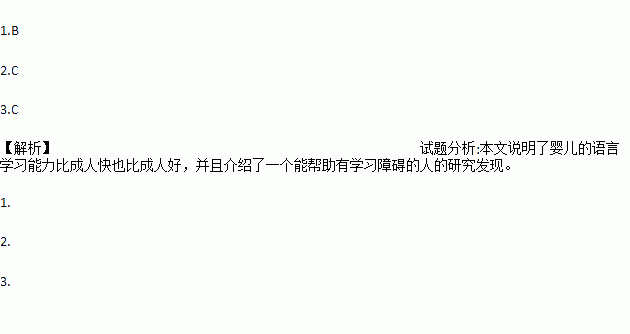题目内容
Newborns begin to develop language skills long before they begin speaking. And, compared to adults, they develop these skills more quickly. People have a hard time learning new languages as they grow older, but babies have the ability to learn any language easily.
For a long time, scientists have tried to explain how such young children can learn the complicated grammatical rules and sounds of a language. Now, researchers are getting a better idea of what’s happening in the brains of the tiniest language learners. This new information might help kids with learning problems as well as adults who want to learn new languages. It might even help scientists who are trying to design computers that can communicate like people do.
Most babies go “ma ma” by 6 months of age, and most children speak in full sentences by age 3. For many years, scientists have wondered how the brains of young children figure out how to communicate using language. With help from new technologies, scientists are now finding that babies begin life with the ability to learn any language. They get into contact with other people, listen to what they say and watch their movements very closely. That is why they quickly master the languages they hear most often.
Studies show that, up to about 6 months of age, babies can recognize all the sounds that make up all the languages in the world. Starting at around 6 months old a baby’s brain focuses on the most common sounds it hears. Then, children begin responding only to the sounds of the language they hear the most.
In a similar way older babies start recognizing the patterns that make up the rules of their native language. For example, English children who are about 18 months old start to figure out that words ending in “-ing” or “-ed” are usually verbs, and that verbs are action words.
1.The new research in the second paragraph can be helpful in _____.
A. finding successful language learners
B. teaching kids with learning problems
C. designing human-shaped computers
D. improving babies’ language ability
2.The researchers found out that babies learn a language mainly by _____.
A. repeating the words of other people
B. remembering the full sentences they hear
C. hearing and closely watching others speak
D. figuring out the meaning of different sounds
3.The purpose of the text is to _____.
A. discuss
B. educate
C. inform
D. entertain
 阅读快车系列答案
阅读快车系列答案
